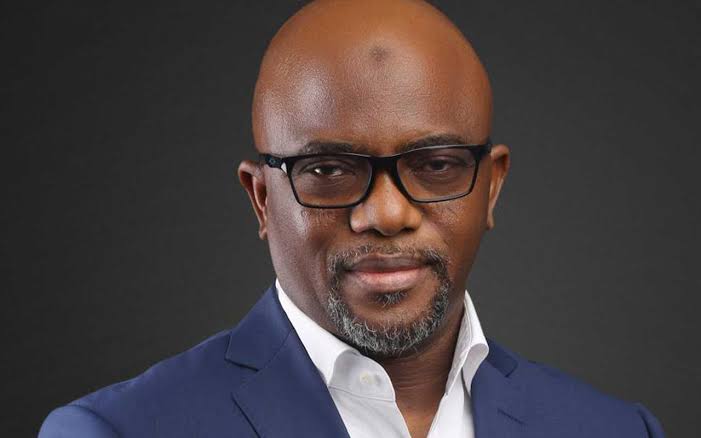Business
Why Matrix Energy Should Stop Dancing Naked* By David Tunde

*Why Matrix Energy Should Stop Dancing Naked*
By David Tunde
In a flagrant and audacious exhibition of corporate greed and regulatory failure, Matrix Energy Limited, a prominent player in Nigeria’s petroleum industry, led by CEO Abdulkadir Adisa Aliu, has become embroiled in a scandal of monumental proportions involving the importation of subpar fuel products. This disturbing revelation, compounded by the company’s alleged complicity in illicit activities, raises grave concerns regarding the integrity of the Nigerian fuel supply chain and the potential perils to public health and safety.
Through the deliberate importation of blended low-grade petroleum products, which are subsequently sold as high-quality fuel, Matrix Energy is not only jeopardizing lives but also subverts the country’s economic governance framework. Abdulkadir Adisa Aliu, a member of the esteemed Presidential Economic Coordination Council (PEEC), is exploiting his position of influence and proximity to powerful and corrupt individuals in the Nigerian Midstream and Downstream Petroleum Regulatory Authority (NMDPRA) , and The Nigerian National Petroleum Corporation (NNPC) Limited to perpetuate these nefarious activities with unbridled impunity.
Matrix Energy’s operations have been irrefutably linked to Malta, a preeminent European hub for the clandestine blending and ship-to-ship (STS) transfers of sanctioned Russian oil and petroleum products. A staggering 35% of shipments arriving in Malta comprise naphtha and other components, which are subsequently blended into petrol to produce “African Spec” products. These products are then transshipped into various vessels for ultimate delivery into Nigeria, perpetuating a complex web of clandestine transactions.
Further investigation reveals that the products from Malta are transported through a labyrinthine network of intermediate ships and companies, including Poly Pro Trading in Dubai. Notably, the listed office of Poly Pro Trading is merely a business center devoid of any physical presence, thereby obfuscating the trail of accountability. This is further complicated by the forgery of paper works and the representation of non-existent companies, which serve as a conduit for these surreptitious transactions and movements.
The fact that Malta, a country devoid of any known oil refineries, has emerged as the top European destination for blending and ship-to-ship transfers of sanctioned Russian oil and petroleum products is a damning indictment of the lack of regulation and oversight in Nigeria’s oil and gas sector. The Nigerian Midstream and Downstream Petroleum Regulatory Authority (NMDPRA) has demonstrably failed in its duty to regulate fuel quality, thereby enabling international commodity traders and Nigerian marketers to exploit this regulatory vacuum and import low-quality fuels with impunity.
Regrettably, the presence of unpatriotic individuals such as Adisa Aliu, Farouk Ahmed, Mele Kyari, and their cohorts in positions of decision-making ensures the perpetuation of the rot in our oil and gas sector, which will continue to thrive on a “balanced diet” of corruption and malfeasance. These are people that are ready to run our economy aground with unbridled greed, bigotry, nepotism, and illegalization of Institutional corruption from one catastrophic selfish agenda to the other, under the guise of improving the Oil and gas sector.
It is intriguing to ponder the rationale behind the selection of Russia and Malta as key players in this illicit operation. However, it is hardly surprising, given that these regions, being under international sanctions, lack stringent measures to curb illegal activities, thereby becoming a haven for corrupt individuals worldwide to converge and indulge in nefarious pursuits for their selfish interests.
The fact that Russia was expelled from the SWIFT global banking framework, comprising nearly 12,000 banks, renders any oil and gas transactions between Nigerian companies and Russian refineries illicit, as Russian banks are unable to open letters of credit for exports. This exposes Nigeria to diplomatic crises that could further compound all that we are going through. Consequently, it is no wonder that Malta has emerged as the premier European destination for blending and ship-to-ship (STS) transfers of sanctioned Russian oil and petroleum products, following the Greek navy’s decision to prohibit such activities in their offshore zone.
Notably, diesel from Russia is notoriously off-spec, and diesels from Matrix filling stations have failed the ASTM D4294 test method, which provides a rapid and precise measurement of total sulfur in petroleum and petroleum products with minimal sample preparation. This egregious situation has led to Matrix Energy peddling flammable diesel with toxic fumes to unsuspecting Nigerians, while reaping enormous profits.
The sheer magnitude of Matrix Energy’s operations is staggering, with over 200,000 tons of gasoline products from Malta allegedly discharged into a Jetty owned by Matrix Energy in July 2024. This represents a staggering 25 percent of Nigeria’s monthly PMS consumption, channeled to a relatively small player with a mere 150 retail stations, highlighting the vast scope of this illicit operation.
The Nigerian Midstream and Downstream Petroleum Regulatory Authority (NMDPRA) is undoubtedly complicit in the importation of substandard diesel and jet fuel into the country, thereby fueling concerns regarding the quality of products utilized in Nigeria. It is a travesty that Africa’s largest oil-producing nation has been importing inferior petroleum products from Malta, a country devoid of any known oil refineries. The evidence of this egregious act is ubiquitous and glaringly apparent to the federal government, unless they choose to willfully ignore it, even without conducting a thorough investigation into the operations of Adisa Aliu and Matrix Energy.
A cursory examination of the cargo trails, the non-existent Dubai business location, and the Malta-Russia adulterated imported fuel, would reveal the extent of this malfeasance. Furthermore, an investigation into the quality of fuel being dispensed at Matrix Filling stations would provide additional evidence of the nefarious activities. If these investigations are thoroughly conducted, the evil nature of Abdulkadir Adisa Aliu’s actions will be laid bare for all to see. His genocidal actions, posing a significant health hazard to Nigerian citizens, increasing the potential mortality rate due to accidents caused by adulterated fuel, and dilapidating the economy for selfish gains, will be exposed.
Matrix Energy’s recent maneuver to seek judicial protection and restrain media houses and other entities from further publishing revelatory stories about its oil shipping business is a farcical spectacle that ranks as one of the most absurd jokes of the century. This attempt to stifle the dissemination of incriminating information constitutes a blatant assault on the sacrosanct right to free expression, a fundamental tenet of democratic societies. By seeking to muzzle the media and suppress the truth, Matrix Energy is attempting to circumvent accountability and perpetuate its nefarious activities, thereby undermining the very fabric of transparency and public discourse.
Aliu’s “dance of shame” must be met with severe consequences. The shame and disdain brought upon Nigeria must be addressed forthwith. Nigeria must not be perceived as a country of fools. We are aware of the situation, and the President must take decisive action to address this madness. The weakness in regulating fuel quality poses a grave health risk to Nigerians. International commodity traders and Nigerian marketers are exploiting this regulatory vacuum to import low-quality fuels. This is grounds for the President to immediately sanction the regulators responsible for policing the midstream and downstream sector and take action concerning the leadership of the Oil and Gas sector in Nigeria.
It is hardly astonishing that Matrix Energy would resort to extreme measures to protect and shield certain influential benefactors, whose identities and interests remain shrouded in secrecy. The primary motivation behind their decision to institute this lawsuit is to insulate and shield their accomplices within the Nigerian National Petroleum Company Limited (NNPCL) and other members of their clandestine cabal from the scrutiny of the media. By doing so, Matrix Energy seeks to conceal the complicity of these individuals and entities in their illicit activities, thereby perpetuating a culture of impunity and shielding them from accountability. This desperate attempt to gag the media and suppress the truth is another evidence to the company’s desperation to maintain the veil of secrecy surrounding their nefarious operations and protect their cohorts from exposure. This audacious move is an affront to the principles of openness and accountability, and it is imperative that it be vehemently resisted to safeguard the integrity of free expression and the public’s right to know.
To effectively mitigate this crisis, the Nigerian government must adopt a resolute and proactive stance. The leadership of the Nigerian Midstream and Downstream Petroleum Regulatory Authority (NMDPRA) and the Nigerian National Petroleum Corporation (NNPC) must be held accountable for their failure to safeguard the interests of Nigerian consumers. Furthermore, the government should undertake a comprehensive overhaul of the regulatory framework governing the importation and distribution of petroleum products to prevent future recurrences of this nature.
Moreover, a thorough investigation into Matrix Energy Limited , and their Cabal’s involvement in illicit activities, including the importation of sanctioned Russian oil, is imperative. If found culpable, the company should face severe penalties, including the revocation of its operating license. It is imperative that Matrix Energy ceases its egregious activities and is held accountable for its actions. The Nigerian people deserve a safe, reliable, and uninterrupted fuel supply, and it is the government’s responsibility to ensure that this is achieved.
The issue at hand extends beyond the mere importation of substandard fuel; it encompasses a complex web of illicit activities, including the importation of sanctioned products, falsification of documents to facilitate smooth operations, and the deliberate alteration of product origin. It is high time that Matrix Energy assumes responsibility for its actions and ceases its exploitative practices.
Nigerians deserve better and demand immediate action from the President to sanction the regulators responsible and address the leadership of the Oil and Gas sector in Nigeria. Matrix Energy’s exploitation of Nigeria’s fuel market and the manipulation of our Judiciary must be halted, and those responsible must be held accountable. The citizens of Nigeria will no longer tolerate being treated as guinea pigs for corporate greed and regulatory failure.
Tunde is an oil and gas expert writing from Dundee, United Kingdom.
Business
Nigeria’s Inflation Drops to 15.10% as NBS Reports Deflationary Trend

Nigeria’s headline inflation rate declined to 15.10 per cent in January 2026, marking a significant drop from 27.61 per cent recorded in January 2025, according to the latest Consumer Price Index (CPI) report released by the National Bureau of Statistics.
The report also showed that month-on-month inflation recorded a deflationary trend of –2.88 per cent, representing a 3.42 percentage-point decrease compared to December 2025. Analysts say the development signals easing price pressures across key sectors of the economy.
Food inflation stood at 8.89 per cent year-on-year, down from 29.63 per cent in January 2025. On a month-on-month basis, food prices declined by 6.02 per cent, reflecting lower costs in several staple commodities.
The data suggests a sustained downward trajectory in inflation over the past 12 months, pointing to improving macroeconomic stability.
The administration of President Bola Ahmed Tinubu has consistently attributed recent economic adjustments to ongoing fiscal and monetary reforms aimed at stabilising prices, boosting agricultural output, and strengthening domestic supply chains.
Economic analysts note that while the latest figures indicate progress, sustaining the downward trend will depend on continued policy discipline, exchange rate stability, and improvements in food production and distribution.
The January report provides one of the clearest indications yet that inflationary pressures, which surged in early 2025, may be moderating.
Bank
Alpha Morgan to Host 19th Economic Review Webinar

Alpha Morgan to Host 19th Economic Review Webinar
In an economy shaped by constant shifts, the edge often belongs to those with the right information.
On Wednesday, February 25, 2026, Alpha Morgan Bank will host the 19th edition of its Economic Review Webinar, a high-level thought leadership session designed to equip businesses, investors, and individuals with timely financial and economic insight.
The session, which will hold live on Zoom at 10:00am WAT and will feature economist Bismarck Rewane, who will examine the key signals influencing Nigeria’s economic direction in 2026, including policy trends, market movements, and global developments shaping the local landscape.
With a consistent track record of delivering clarity in uncertain times, the Alpha Morgan Economic Review continues to provide practical context for decision-making in a dynamic environment.
Registration for the 19th Alpha Morgan Economic Review is free and can be completed via https://bit.ly/registeramerseries19
It is a bi-monthly platform that is open to the public and is held virtually.
Visit www.alphamorganbank to know more.
Business
GTBank Launches Quick Airtime Loan at 2.95%

GTBank Launches Quick Airtime Loan at 2.95%
Guaranty Trust Bank Ltd (GTBank), the flagship banking franchise of GTCO Plc, Africa’s leading financial services group, today announced the launch of Quick Airtime Loan, an innovative digital solution that gives customers instant access to airtime when they run out of call credit and have limited funds in their bank accounts, ensuring customers can stay connected when it matters most.
In today’s always-on world, running out of airtime is more than a minor inconvenience. It can mean missed opportunities, disrupted plans, and lost connections, often at the very moment when funds are tight, and options are limited. Quick Airtime Loan was created to solve this problem, offering customers instant access to airtime on credit, directly from their bank. With Quick Airtime Loan, eligible GTBank customers can access from ₦100 and up to ₦10,000 by dialing *737*90#. Available across all major mobile networks in Nigeria, the service will soon expand to include data loans, further strengthening its proposition as a reliable on-demand platform.
For years, the airtime credit market has been dominated by Telcos, where charges for this service are at 15%. GTBank is now changing the narrative by offering a customer-centric, bank-led digital alternative priced at 2.95%. Built on transparency, convenience and affordability, Quick Airtime Loan has the potential to broaden access to airtime, deliver meaningful cost savings for millions of Nigerians, and redefine how financial services show up in everyday life, not just in banking moments.
Commenting on the product launch, Miriam Olusanya, Managing Director of Guaranty Trust Bank Ltd, said: “Quick Airtime Loan reflects GTBank’s continued focus on delivering digital solutions that are relevant, accessible, and built around real customer needs. The solution underscores the power of a connected financial ecosystem, combining GTBank’s digital reach and lending expertise with the capabilities of HabariPay to deliver a smooth, end-to-end experience. By leveraging unique strengths across the Group, we are able to accelerate innovation, strengthen execution, and deliver a more integrated customer experience across all our service channels.”
Importantly, Quick Airtime Loan highlights GTCO’s evolution as a fully diversified financial services group. Leveraging HabariPay’s Squad, the solution reinforces the Group’s ecosystem proposition by bringing together banking, payment technology, and digital channels to deliver intuitive, one-stop experiences for customers.
With this new product launch, Guaranty Trust Bank is extending its legacy of pioneering digital-first solutions that have redefined customer access to financial services across the industry, building on the proven strength of its widely adopted QuickCredit offering and the convenience of the Bank’s iconic *737# USSD Banking platform.
About Guaranty Trust Bank
Guaranty Trust Bank (GTBank) is the flagship banking franchise of GTCO Plc, a leading financial services group with a strong presence across Africa and the United Kingdom. The Bank is widely recognized for its leadership in digital banking, customer experience, and innovative financial solutions that deliver value to individuals, businesses, and communities.
About HabariPay
HabariPay is the payments fintech subsidiary of GTCO Plc, focused on enabling fast, secure, and accessible digital payments for individuals and businesses. By integrating payments and digital technology, HabariPay supports innovative services that make everyday financial interactions simpler and more seamless.
Enquiries:
GTCO
Group Corporate Communication
[email protected]
+234-1-2715227
www.gtcoplc.com
-

 celebrity radar - gossips6 months ago
celebrity radar - gossips6 months agoWhy Babangida’s Hilltop Home Became Nigeria’s Political “Mecca”
-

 society6 months ago
society6 months agoPower is a Loan, Not a Possession: The Sacred Duty of Planting People
-

 society5 months ago
society5 months agoReligion: Africa’s Oldest Weapon of Enslavement and the Forgotten Truth
-

 news6 months ago
news6 months agoTHE APPOINTMENT OF WASIU AYINDE BY THE FEDERAL GOVERNMENT AS AN AMBASSADOR SOUNDS EMBARRASSING







